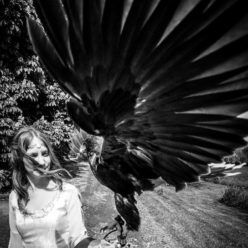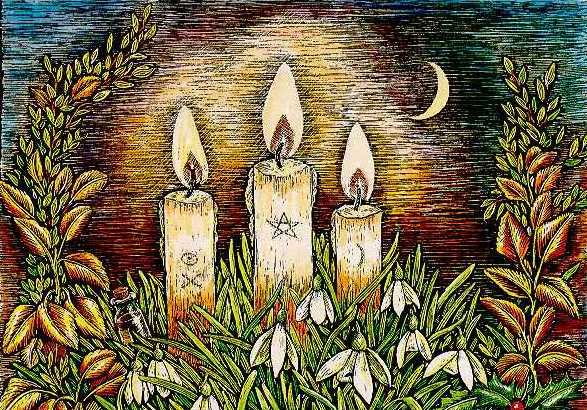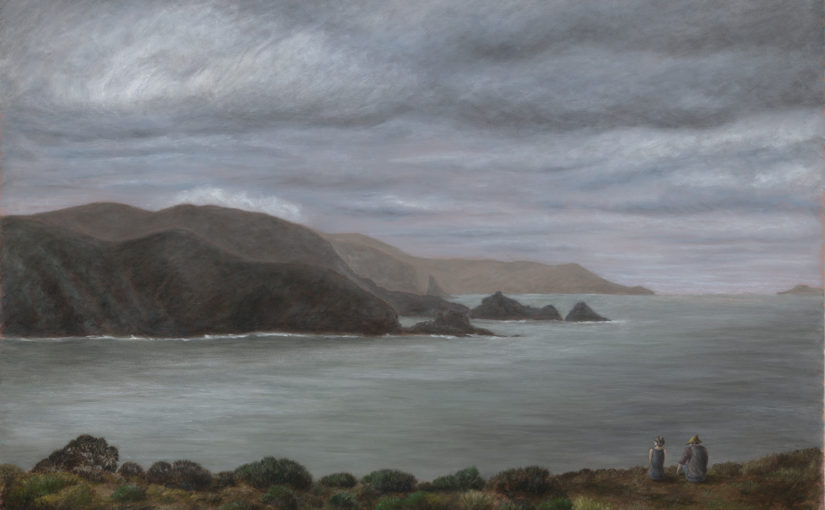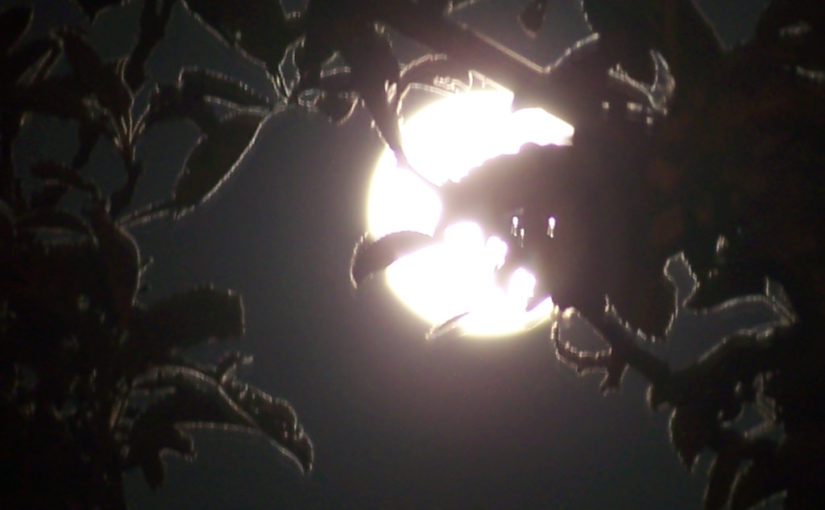My body has fallen back in with its Northern rhythms. There was Imbolc, brief reprise of snowdrop and crocus, brave buds peeping early, but now winter storms have come again. I sit in a turret, with half a panopticon of vista to watch the winds whip bare birch and oak, the hazel’s pale catkins turning yellowish to play dead. Rain is driven in visible sheets before the woodlands and the brook below rages, plunging its steel grey waters.
This reminds me of other turrets; writing in a Goulburn neo-gothic villa, and precarious above the sea at Eden with the writhing jacaranda. But we do things more quietly here in England. There is no wide ocean passage or endless limestone plain. Just ivy choked trees like a mockery of eucalypt regrowth, the green field, the brook, the rain – persistent, but somewhat tamed. Wind howls in cracks in the windows between the ladybird infestations I’m newly discovering. Magpies gather in nursery rhyme prophecies on the grass below. I read them.
Yesterday, I walked along the canal. Stamped mud up my long brown skirt, drenched it in the rain then it was blown dry again by the end of the walk.
If this is all sounding like a typical bucolic idyll where Chris hedge witches about or tramps the fields to the farm shop like Tess of the feckin’ d’Urbervilles, let me disabuse you.
I have moved to Birmingham.
Without is no wilderness, or whatever passes for it in England. I can see the tower blocks from my windows, and the copse runs to the grey tarmac web of roads soon enough. But undeniably, our new apartment is nice. It has two bedrooms. It has a balcony. It will have birds – although not cockies. It is indeed in a warm, south-facing turret with a marvellous panorama. It is by a large playing field, a raging torrent of a brook, the Stratford and Avon canal and is bordered by strips of woodland. So I get all that ruralish bliss, but because it’s just down the road from King’s Heath high street, the buses also come every four minutes. Winner winner.
Since arriving back in England, I calculate I have slept in about eight different beds. We finally have our own little place, and it’s not even shit, and I’m relieved. Today I have spent the afternoon scrubbing skirting boards and dusting venetian blinds while listening to an abridged audiobook about ‘wintering.’ It’s very Chris. This clever writer even managed to hit upon a whole lot of the insightful comments I already made about winter in my last blog. I tell you, it’s a crime I don’t have my own radio 4 podcast yet. But this writer certainly focused on all the good stuff about using winter to rest and rethink. Wallow, I say. Embracing sadness, stillness, quiet. So I meditated very profoundly on these deep thoughts while balanced on the windowsill until I opened the window to let out a mysterious ladybird and a whole fucken swarm of flies collapsed onto me.
So that was stillness, repose, and very nearly me, right out the window. Seemingly ladybirds are sort of nesting in the window frame. The bit where you open it, on the side there, don’t look too closely, it’s probably where the spiders lurk, although I’ve never worked out how they don’t get squished. But in the case of my windows, there’s an intimidating number of ladybirds crawling over each other, potentially preyed upon by the swarm of flies that also seem to inhabit the area. Perhaps it’s not so bleak. Perhaps they all live in the window frame in some sort of symbiotic harmony, like an epiphyte or something; but I tell you what, they’re not bloody living in harmony there anymore because I poked them all away with a pen lid.
That shall need further Dealing With.
Goodness, this wind has got rather more intense; as has the rain. I shall be able to see a soggy Gentleman walk up the path from here soon enough. Poor man. Have a care also for the poor spider in the left-most window; she has spun her web outside and is being rudely buffeted, but she is an English spider so I don’t need to move out and leave her the keys – she won’t be trying to kill me in my sleep.
Other things I have been doing in my two days At Home is traipse to Lidl and back (it’s like Aldi, chaps – and we even have Aldi in the UK too) to restock cupboards. I thought regretfully of all my nuts and seeds and stacks of food organised serenely in Jen’s Northbourne cupboard, but of course, I’m just glad it didn’t go to waste. Meanwhile, I rebuild my spice collection starting with C and working up.
I have seen most friends since getting back. And shout out to those dear bosom friends of the soul – who keep me in their hearts while I slip away for three years and welcome me home again as if I’d never left. After my mother’s arms and her insatiable pouring of wine, nothing made me feel more at home than reuniting with people who let me just guiltlessly pick up where I left off – who clearly didn’t begrudge my absence but were just happy for my return and the time I’d had. As I get older, I hit happy milestones of having known some friends longer than I haven’t, and there is much to be said for having friends that have seen you grow from idealistic student to embittered teacher and still like you anyway. I am aware I’m pulling a bit of a Victor Frankenstein, here, lamenting that old friends of youth are the only true ones, and new friends are never as good, while he dies by the new friend who rescued him from the ice. Poor Walton. I shall do no such thing – and I hope my Australian friends will stay close as I work to keep the Australian version of me true and open.
Which I suppose brings me to my new job and how my friends are helping me in to that. Having applied to a swathe of jobs, I’ve accidently got one that isn’t teaching. This has been an intense mind shift. Instead of marking mocks and guiding young people towards my leftist agenda through peace, love and literature an’ all that, I’ll be doing a junior admin role with the Open University. Working from home, in my little turret here. Seven and a half hours a day.
The same day I was offered this job, I was also offered an interview for a teaching role with a TLR in a school out past Wolverhampton. I sat down to prepare my interview lesson, I spent two and a half hours in Birmingham library stimulatingly researching the poem to teach, the method I would use, the resources, and realised I had completed only the first fifteen minutes of the lesson. I didn’t sleep for two nights, felt sick on the day of the interview and needed to poo five times before leaving. And that is how I feel for the whole first year in a new school. I am such a fuck up. But I really don’t miss that. The feeling that even after hours of planning one lesson, doing it completely differently might turn out to be more effective. You just don’t know. And there isn’t the time to plan lessons to that extent. And I don’t know what it was, but while I was sat in the inevitable breaktime come-and-bog-at-the-new-teachers session I felt … some of the toxicity of teaching again. The comparing of yourself, the trying to outdo each other, the show-offyness. But that’s all neither here nor there – I didn’t get the job, so junior admin role it is. It’s not a pay cut; right now, I’m on nothing, so it’s a definite pay rise.
I have gone through several waves of emotion on all this. First, I thought of all my marvellously clever friends who are role models and leaders, like Brooke and Claire in Australia, and Jenny in London and worried they might not want to be my friends anymore because I’m not in their league as a junior earner and lowly admin. Then I realised that was not only foolish pride, but also quite insulting to their integrity and decency. Then I felt like I was betraying my beautiful teacher friends like Corinne, Spellman, Emma-wife and Grace by abandoning them. ‘Confessing’ to Corinne made me feel better. Going back to my old school, where my old role doesn’t seem to be … thriving, made me feel worse – I should be sorting this out. Sitting with Emma on the floor of her spare room while she looked like she was about to pass out with exhaustion made me…think again. I love working with young people and sharing literature. But that seems to be less and less what teaching is allowed to be.
Part of me is a bit embarrassed that I couldn’t get a role of equivalent responsibility outside of my sector. Lots of people manage it. I expected a drop in pay, but not quite this much. Hearing other people talk about the things they’re doing at work that sound so important and exciting make me feel a bit ashamed of myself. But I don’t start till Monday, so who knows, my job could be that too.
Ultimately, I come back to Imbolc. The cold part of early spring, where things begin to grow from tiny, vulnerable shoots that may either die or thrive. Yup, I’ve picked a bit of a nervy time to change from a stable, well-paid career to a very junior one. Australia – I’m sure you’ve heard about fuel price increases which are global, but the UK is facing a major cost of living crisis this spring. Whoops. But I am also hoping this job in an excellent organisation will lead to more challenging things. I know there are excellent opportunities in the OU; I applied for them and didn’t get interviews. I’ll apply again.
And there will be growth in other ways. It’s morning now and I have re-established The Routine, even though I lamentably don’t have Hanna anymore to keep me accountable. I was up at six, did a HIIT, washed and was writing this by half past seven. I mean very much to keep up writing and the successes I’ve had in Australia. I will be planning it in and using the extra brain-space and weekends (where I’m too poor to go away) to finish novels and try to develop as a writer. I needs must first buy myself some sort of floppy sleeved linen shirt a la The Death of Chatterton, now that I am going to be a poor, struggling artist. Really lean in to that, you know? But all my life I’ve not had to think much about what happens next, because the term drives you forwards and tells you what to do. Now I must decide. I’ve realised in the last few years how damn lazy I’ve always been, how I actually find it a bit of a struggle to push myself to do things I don’t have to do. I was a bare minimum kid who was lucky enough to be reasonably smart. This will be real growth, real change. It will be hard.
It’s a beautiful morning. Storm Eunice is on its way. Things are lovely, then hard – there is no linear trajectory, just cycles. I will be soothed by sunshine and blackbirds and feel strong and happy and capable. Later, even though I know it’s coming, I won’t be able to stop myself being anxious or overwhelmed or deflated when things are difficult, despite logically knowing it’ll be alright. But I know I’ll survive it.
Growing hurts. This is the lesson of wintering. Poke green fingers through the earth and frost will bite them. But snowdrops grow anyway. So you must poke, try, make, and when it hurts, it’s a reminder you’re growing.



